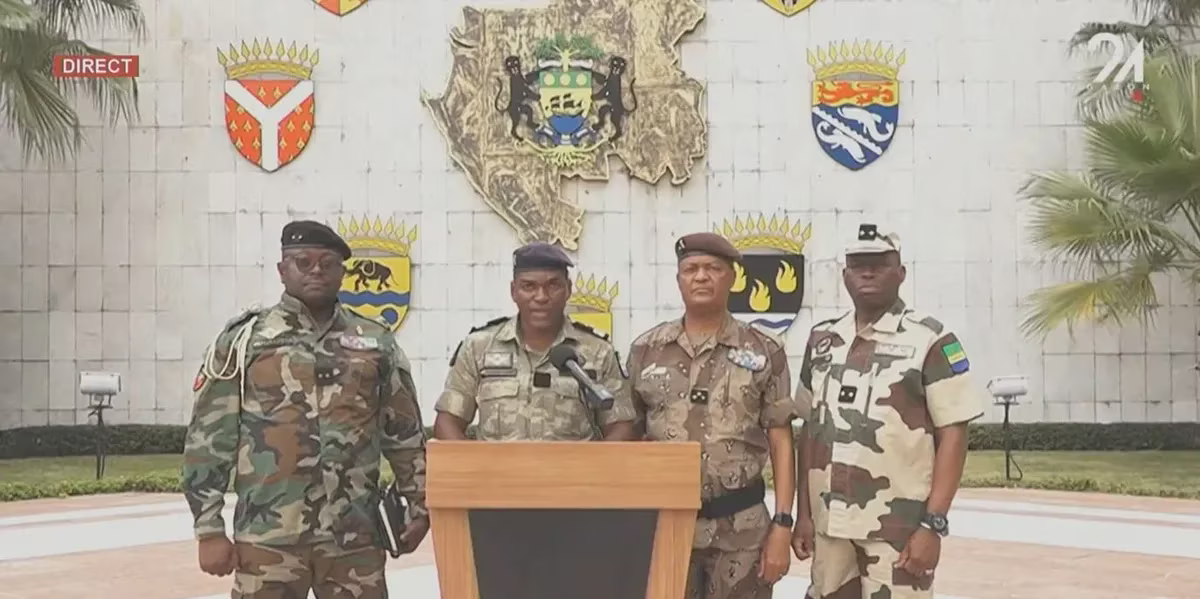Euphoric crowds in the streets of Gabon and Niger have been celebrating military coups in recent weeks. The same scenes of postcoup jubilation erupted in Burkina Faso last year, and in Mali the year before.
The takeover trend, often called “coup contagion,” has swept across big swathes of the continent since 2020, hailed by many ordinary Africans who have grown frustrated by decades of inequality, powerlessness and poverty.
But a closer look at Africa’s coup history suggests that the exultant crowds are likely to be deeply disappointed. Military putsches have failed to provide any quick-fix solutions to the chronic problems of their countries.
In 2017, thousands of Zimbabweans thronged ecstatically in the streets when the country’s military seized power. They cheered the tanks and the soldiers, celebrating the military’s arrest of long-ruling autocratic president Robert Mugabe.
But disillusionment soon set in. Zimbabwe’s economy continued to collapse, and political repression grew worse. Protests in 2018 were crushed by military bullets. Last month’s election was widely seen as rigged. Election observers from neighbouring African countries condemned the regime’s intimidation tactics.
In 2019, many people were optimistic when Sudan’s military toppled president Omar al-Bashir, the dictator who had dominated the country for 30 years. But it soon became clear that the military was unwilling to share power with civilians. Today, two military factions are locked in a catastrophic conflict, killing thousands of Sudanese people and forcing millions to flee their homes.
Even the latest West African coups – in Mali, Burkina Faso and Niger – have brought no improvement to the brutal conflicts sparked by Islamist insurgencies that the coup leaders had promised to fix. The violence has instead continued to worsen, and the rebels have gained more territory.
Until recently, the number of coups had been declining in Africa, compared with the Cold War era when they were widely tolerated. But the trend has reversed in the past decade and accelerated since 2020, with nine putsches in seven countries – none of which been overturned.
Every coup is different, and the local factors are different in every country, but the coup plotters have exploited a common frustration among millions of Africans who have come to see military takeovers as one of the few possible alternatives to their failed governments.
Many civilian rulers, despite democratic pretensions, have clung to power by rigging elections, eliminating term limits, harassing opposition leaders and intimidating voters. Desperate for change, especially as living costs have soared since the Russian invasion of Ukraine, many Africans are losing hope in elections. They often see the military as the only power that can dislodge an unpopular ruler or an inept government.
Recent polling by Afrobarometer, a pan-African survey organization, found that 53 per cent of respondents in 28 African countries in the past two years were willing to accept military intervention if elected officials were abusing their power. In a larger sample over the past two decades, the surveys found rising support for military rule in a majority of the 38 countries with polling data. While a majority are still opposed to military rule, support has doubled in the past 20 years.
The pro-military mood is a symptom of African discontent with their governments and the lack of democratic change, according to a study of the polling data by Carlos García Rivero, a researcher at the Centre for International and Comparative Politics at Stellenbosch University in South Africa.
“Waiting for the next elections to take place to change government does not seem to them to be a good option,” Mr. García Rivero said in a published summary of his study.
“Opposition parties do not seem to enjoy a better image. For the survey respondents, the solution appears to be to welcome the military to intervene. If citizens perceive that politicians don’t care about them, this will invite the military to continue overthrowing civil governments, with society publicly legitimizing their intervention.”
But the proliferating coups are fuelled by more than just popular sentiment. Military officers who seize power are emboldened by the failures of international efforts to restore civilian rule.
The African Union has a policy of suspending the membership of countries where coups occur, but it rarely supports any stronger action – and it ignored Zimbabwe’s coup in 2017, pretending it never happened. Western governments take a rhetorical stance against military takeovers, but coup leaders know that their regimes are protected by Russia and China, which routinely block any action by the United Nations Security Council. When regional bodies close their borders or impose sanctions against them, coup leaders know that they can still trade with China or Middle Eastern countries. Threats of military intervention have proven empty.
After the Niger coup in July, Nigerian President Bola Tinubu called for a regional military force to intervene, and he warned that a lack of action could trigger further takeovers. A few weeks later, military officers seized power in Gabon.
“My fear has been confirmed in Gabon that copy cats will start doing the same thing,” Mr. Tinubu said.
Coup leaders often pose as liberators, exploiting popular discontent with pro-Western governments, especially in former French colonies where France still had a military presence. But on most economic and security issues, military regimes have performed poorly.
“The record of military rulers has been as bad, if not altogether more atrocious, as when civilians have been in charge,” said Moses Khisa, a Ugandan political scientist and co-author of a book on coups.
“Coups are a convenient power grab, just like rigging elections,” he wrote in a Ugandan newspaper. “It is not just that military rulers tend to have a horrible human rights record, it is also that African economies never do well under military rulership.”

